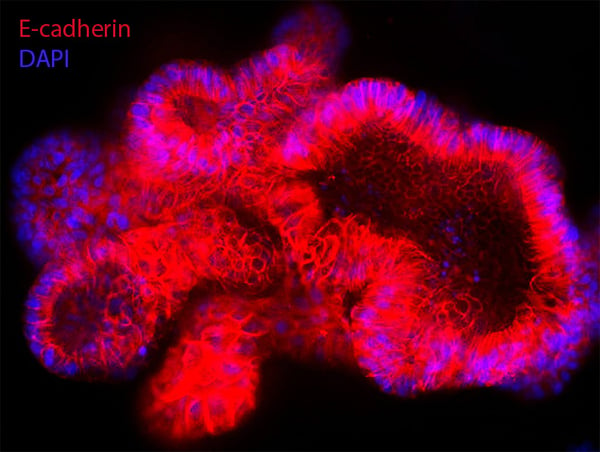DefiniGEN launches tool for coronavirus-specific intestinal cell research
May 14, 2020
 DefiniGEN iPSC-derived organoids display positive staining of key intestinal cell markers including epithelial cells (E-cadherin).
DefiniGEN iPSC-derived organoids display positive staining of key intestinal cell markers including epithelial cells (E-cadherin).
UK headquartered iPSC disease modelling company DefiniGEN has identified iPSC-derived intestinal organoids that could be used to help structure in vitro studies of the biology of SARS-CoV2 infection across cohorts of multiple patients.
While SARS-CoV-2 primarily targets the respiratory system, studies have shown that it also infects and multiplies within the intestinal epithelium. IPSC-derived organoids exhibit characteristics that closely mimic the in vivo intestinal epithelium, making them a valuable surrogate model for studying the virus.
Intestinal Organoids
DefiniGEN iPSC-derived intestinal organoids provide a unique in vitro system to model the human intestine. The organoids display a polarized epithelium and harbor a mixture of cell types normally present in the primary intestinal epithelium barrier in vivo, including goblet cells, Paneth cells, enterocytes, LRG5+ stem cells, and enteroendocrine cells. The organoids polarise, form crypt structures and grow villi at the apical surface, and are shown to secrete mucus in a similar manner to primary human gut tissue.
Several studies have proven that angio-tensin-converting enzyme 2 (ACE2) expression in host cells is required for SARS-CoV-2 recognition and infection (1,2). Activity of membrane proteases such as TMPRSS2 cleaves the coronavirus' Spike protein and facilitates the membrane fusion with the host cell (3). Human intestine is one of the few human tissues with high expression of both ACE2 and TMPRSS2 (4) therefore is a good candidate to study Covid19 and the mechanisms of the SARS-CoV-2 infection.
Patient-derived organoid models
There is growing evidence that ethnic differences are a major factor in patients showing a severe response to Covid19.
DefiniGEN have a platform to generate various patient-derived intestinal models which could support population studies, using many different donors with diverse ethnic profiles.
DefiniGEN’s differentiation platform is optimized to enable successful generation of intestinal organoids from a diverse range of patients. Patient skin fibroblasts or PBMCs can first be reprogrammed to iPSC, and then differentiated to produce mature intestinal organoids which carry the original patient genetics, and so manifest a gut model specific to that donor.
Studies have found significant differences exist between donors in their capacity to generate endodermal human cells via iPSC, however DefiniGEN's platform offers a much higher success rate in producing good quality mature and biologically representative organoids. We titrate a number of differentiation parameters at a small scale to establish the best conditions for downstream cell production, which helps control for the usual heterogeneity in successful differentiation and allows us to work with diverse cohorts of patients with reproducible success.
The platform can help structure studies of multiple patient’s biological reactions in the gut to SARS-CoV2 infection
For more information, please visit https://www.definigen.com/
Publications
- Hoffmann et al., SARS-CoV-2 Cell Entry Depends on ACE2 and TMPRSS2 and Is Blocked by a Clinically Proven Protease Inhibitor, Cell (2020), https://doi.org/10.1016/j.
cell.2020.02.052 - Wang et al., Structural and Functional Basis of SARS-CoV-2 Entry by Using Human ACE2, Cell (2020), https://doi.org/10.1016/j.
cell.2020.03.045 - Tang, T., Bidon, M., Jaimes, J.A., Whittaker, G.R., Daniel, S., Coronavirus membrane fusion mechanism offers as a potential target for antiviral development, Antiviral Research, https://doi.org/10.1016/j.
antiviral.2020.104792 - Sungnak, W., Huang, N., Bécavin, C. et al. SARS-CoV-2 entry factors are highly expressed in nasal epithelial cells together with innate immune genes. Nat Med 26, 681–687 (2020). https://doi.org/10.1038/
s41591-020-0868-6
About DefiniGEN Ltd
DefiniGEN has world-leading expertise in the area of stem cell-derived human cell production and metabolic disease modelling. The company has developed a best-in-class proprietary stem cell differentiation technology platform to generate mature, phenotypically relevant human hepatocytes, pancreatic cells and intestinal organoids. The platform can generate a range of unique metabolic disease models to accelerate preclinical drug development via the sourcing of patient samples and reprogramming to stem cells or alternatively using CRISPR gene-editing on stem cell lines and differentiating them on the technology platform. The models can deliver unparalleled insights into the biology of metabolic disease in a range of 2D and 3D formats which can integrate effectively into high-throughput screening programmes and investigative studies. The application of these cell models in drug discovery provide pharmaceutical companies with more predictive in vitro cell tools to optimize the development of safe and efficacious therapies for life-threatening metabolic diseases.
Visit https://www.definigen.com/. Follow on Twitter and LinkedIn





